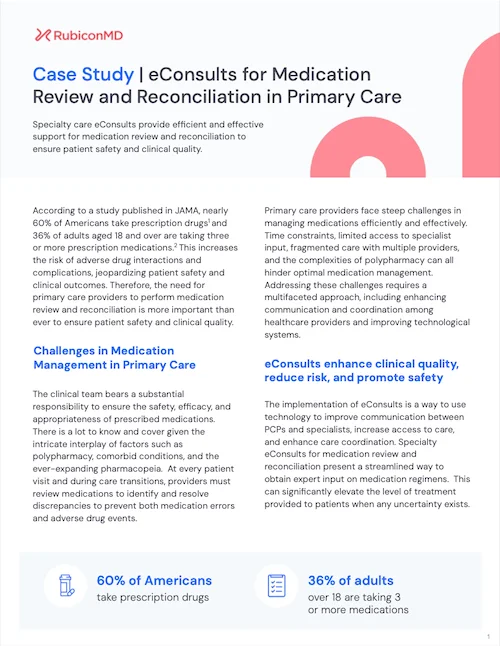Expanding on the Vision for Value-Based Care: How eConsults Can Help Realize Better Outcomes
Value-based care must be central to the future of the U.S. healthcare system — reducing cost, improving outcomes, and most…
In January, we outlined the top trends set to shape primary care in 2025, with a focus on how eConsults could help address rising costs, specialist shortages, and growing patient complexity. Read the trends report here.
Now, nine months later, it’s time to revisit those predictions. Which have materialized? Where is progress uneven? And how is artificial intelligence (AI) shifting the healthcare landscape?
Prediction confirmed ✅
Adoption continues to expand as organizations seek to control specialty care costs while improving access. Studies show that up to 70% of specialty referrals can be avoided through eConsults, leading to significant downstream savings.1
Prediction confirmed ✅
EHR integration remains a top priority, as national surveys of PCPs cite EHR burden as a major driver of dissatisfaction.2 Systems that provide seamless integration allow PCPs to initiate, track, and act on eConsults without leaving the patient record. RubiconMD offers support for many different technologies to allow interoperability across a fragmented EHR space, along with the following workflows to fit seamlessly into the PCPs’ work day:
EHR integration allows primary care practices to systemetize eConsult workflows such that submissions are used to achieve quality measures and financial goals. Many practices require eConsults for certain specialities or conditions to ensure referral avoidance and maximize cost savings.
Prediction confirmed—and gaining traction 📈
Organizations are increasingly embedding nurses, care coordinators, and scribes into the eConsult process. This ensures eConsults are initiated and managed efficiently, freeing PCPs to focus on direct patient care.
Research from the AAFP and others continues to show that team-based care models improve clinician satisfaction and patient outcomes.3 AI now plays a supporting role, drafting notes or flagging missing data, but team-based collaboration remains the cornerstone of successful implementation. Our speciality network is the nation’s leading collective of specialists, representing over 140 specialties and specialty areas of expertise, and rated 4.9/5 by PCPs.
Prediction confirmed ✅
Health systems are moving beyond ad hoc use and implementing structured eConsult programs for high-cost, high-need conditions like diabetes and hypertension. These workflows reduce variability, improve timeliness, and enhance care coordination. RubiconMD case studies have demonstrated measurable improvements in chronic disease outcomes when eConsults are integrated programmatically.
Prediction confirmed ✅
Patients increasingly understand eConsults as part of modern care delivery. While the process is largely invisible to them, they feel the benefits—faster guidance, fewer unnecessary referrals, and the reassurance that their PCP has rapid access to specialty expertise. Studies show that patients prefer to have their care managed by their PCP with eConsults when compared with traditional in-person specialist visits.4 Check out how RubiconMD engages patients in their healthcare journey here.
The acceleration of AI adoption in 2025 has been extraordinary. From auto-generating notes to analyzing imaging, AI is reshaping workflows across medicine. Tools now draft documentation, summarize patient histories, and highlight clinical gaps. In radiology and pathology, AI systems are increasingly embedded in routine workflows.5
But its limitations are just as clear. Algorithms cannot weigh social context, anticipate subtle risks, or balance competing priorities for a complex patient. That requires judgment—judgment only human specialists can provide.
eConsults deliver shorter wait times and reduced costs without sacrificing human expertise. RubiconMD specialists are able to deliver clinical nuance, empathy, and accountability that providers and patients alike can depend on.
Our January predictions held true. eConsult adoption continues to climb, EHR integration is advancing (though work is still under way), and patients are more engaged in their care journey than ever.
For primary care leaders, the path forward is clear:
eConsults exemplify balance in health tech: a system where technology streamlines processes, while clinicians remain the compass for guiding safe, equitable, and patient-centered care.
Value-based care must be central to the future of the U.S. healthcare system — reducing cost, improving outcomes, and most…
CHICAGO, IL — RubiconMD, the leading technology platform providing access to specialist expertise, today announced it has delivered one million…
The Program of All-Inclusive Care for the Elderly (PACE) plays a vital role in helping older adults remain in their…

Explore real examples of specialty care eConsults providing efficient and effective support for medication review and reconciliation.